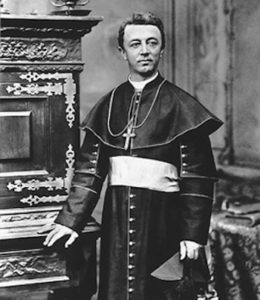
James A. Healy
*On this date, in 1830, James A. Healy was born. He was a Black priest and the first Black Bishop in America.
James Augustine Healy was from a plantation near Macon in Jones County, Georgia. He was the oldest of ten children of Michael Morris Healy and Mary Eliza Smith, a Mulatto slave. Healy's white father emigrated from Ireland in 1818. He won a lottery drawing for 1300 acres of land five years later. In 1829, Healy’s father began a common-law marriage with Eliza, who was 16 years old. Because James and his brothers and sisters were considered slaves under Georgia law, his father was forced to enroll them in Northern schools.
James and his oldest brother began at a Quaker school on Long Island. Racism from residents caused their move to grammar, secondary, and collegiate schools at the new Holy Cross College in Worcester, Massachusetts. Healy finished at the top of the first graduating class in 1849 and earned a master's degree two years later. He spent a brief period in a seminary in Montreal, Canada, but his parents' deaths in 1850 forced him to return to Holy Cross. After settling the estate, he enrolled in the Sulpician Seminary in Paris, France. He was ordained a priest there in 1854. He began his ministry with the Diocese of Boston, his home for the next 21 years.
He overcame any resistance with his dedicated service through cholera, typhoid, and tuberculosis outbreaks. Healy moved his three youngest siblings to a home in West Newton. He worked as Bishop John Fitzpatrick's secretary and chancellor and then as Rector of the Cathedral of the Holy Cross during the American Civil War. From 1866 to 1875, he was pastor of Boston's largest parish, St. James. During his tenure, he oversaw the construction of the large basilica-type Church, which is still standing and served as the Bishop's "point man" for social action. His efforts led to the establishment of the Home for Destitute Catholic Children, the House of the Good Shepard, and St. Ann's Foundling Home.
An admired orator, Healy spoke at Church dedications and Boston's first great Catholic Festival in 1874. He successfully defended a challenge to the Church's tax-exempt status in the Massachusetts Statehouse by pointing out the tremendous amount of money the Church saved the State by doing social welfare work. 1875 Pope Pius IX named him the Bishop of Portland, Maine. For the next 25 years, he managed a diocese that included Maine and New Hampshire. Under his administration, 60 churches, 18 schools, and an equal number of convents and welfare institutions were built, and the Catholic population doubled to nearly 100,000. He was called "the children's Bishop" because of his efforts on behalf of American Civil War widows and orphans, his opposition to child labor abuses, and the orphanages he had constructed.
It was his custom to let children hitch their sleds to his sleigh so he could give them rides in the winter. Those without sleds rode with him. His pockets always seemed to contain candy or cookies. He bought one-half of an island near Portland, Maine, as a summer vacation spot for orphans, for whom he had a special affection. He visited them often and loved to hold the very smallest ones. Bishop Healy took a leadership role in the American Catholic hierarchy. He proposed three major church legislations that the Third Council of Baltimore passed. He was on the committee that established the Catholic University of America in Washington, D.C.
He was a member of the Council's commission for Negro and Indian missions. He was also a consultant to the U.S. Bureau of Indian Affairs. His Black ancestry was a problem when he traveled to the South, but he insisted on visiting there on church business. His racial background did not affect the many priests who served under him. Bishop Healy died of a heart attack on August 5, 1900. More than 200 priests, seven bishops, judges, and state legislators attended his funeral.
To Become a Social/Community Service Manager
Black First:
2,000 years of extraordinary achievement
by Jessie Carney Smith
Copyright 1994 Visible Ink Press, Detroit, MI
ISBN 0-8103-9490-